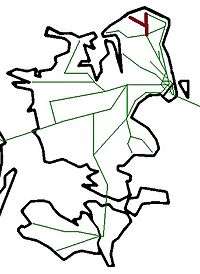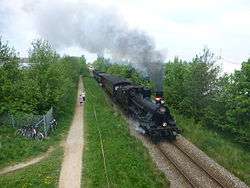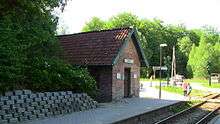Gribskov Line
| Gribskov Line | |
|---|---|
 | |
| Overview | |
| Native name | Gribskovbanen |
| Type | Railway |
| System | Danish railways |
| Status | Active |
| Termini |
Hillerød 55°55′37″N 12°18′39″E / 55.9270°N 12.3107°E Tisvildeleje 56°03′33″N 12°04′40″E / 56.0593°N 12.0778°E Gilleleje 56°07′25″N 12°18′11″E / 56.1237°N 12.3030°E |
| Stations | 19 |
| Operation | |
| Opened |
Hillerød–Græsted: 20 January 1880 Græsted–Gilleleje: 14 May 1896 Kagerup–Helsinge: 16 June 1897 Helsinge–Tisvildeleje: 18 July 1924[1] |
| Owner | Hovedstadens Lokalbaner |
| Operator(s) | Lokaltog[2] |
| Character | Local railway |
| Rolling stock | LINT 41 |
| Technical | |
| Line length | 42.0 kilometres (26.1 mi)[1] |
| Number of tracks | Single |
| Track gauge | 1,435 mm (4 ft 8 1⁄2 in) |
| Electrification | No |
| Operating speed | 75 km/h |
The Gribskov Line or the Gribskov Railway (Danish: Gribskovbanen) is a local passenger railway line in North Zealand north of Copenhagen, Denmark.
The line runs north form Hillerød through the Gribskov forest and splits into two branches to the seaside resort towns of Tisvildeleje and Gilleleje. Connecting the wide belt of holiday homes along the northern coast of Zealand with Copenhagen is an important role of the Gribskov Line.
The railway is standard gauge and single track. It opened in various sections between 1880 and 1924. The distance from Hillerød to either Tisvildeleje or Gilleleje is about 25 kilometres (16 mi), with the total track length being 42.0 kilometres (26.1 mi).[1]
The railway is currently owned by Hovedstadens Lokalbaner and operated by the railway company Lokaltog.[2] Lokaltog runs frequent local train services from Hillerød station to Tisvildeleje station and Gilleleje station with most trains continuing from Gilleleje along the Hornbæk Line to Helsingør station.
History

The railway opened in various sections between 1880 and 1924. The first 19.7 km (12.2 mi) long section of the railway line from Hillerød to Græsted opened on 20 January 1880. The next 6.2 km (3.9 mi) long section from Græsted onwards to Gilleleje opened on 14 May 1896. On 16 June 1897 the 6.0 km (3.7 mi) long branch line from Kagerup to Helsinge opened. The last 10.1 km (6.3 mi) long section from Helsinge to Tisvildeleje opened on 18 July 1924.
Route

The line runs north from Hillerød where transfers from the S-train system as well as other Lokalbanen lines are possible, and through the Gribskov forest. At Kagerup near the northern end of the forest it splits into two branches going to Tisvildeleje and Gilleleje.
Operations
Trains on the Gribskov Line is operated by the railway company Lokaltog.[2] Lokaltog operates a fairly intensive timetable on the Gribskov Line with light DMUs working a fixed 30-minute frequency most of the day. Most passengers connect from the Nordbanen S-trains at Hillerød.
Until late 2007, transfers to and from the Hornbæk Line were needed at Gilleleje, but after major changes to Gilleleje station, trains now operate through Gilleleje to Helsingør along the Hornbæk Line, eliminating the need to change at Gilleleje.
Heritage train

During the summer months of July and August, Nordsjællands Veterantog operates weekend steam trains on the Gribskov Line between Græsted and Gilleleje, continuing along coast on the Hornbæk Line to Grønnehave station in Helsingør. This has been a tradition since 1971.[3]
Stations

- Hillerød
- Slotspavillonen
- Kildeport (closed)
- Gribsø
- Kagerup
Tisvildeleje branch
- Duemose
- Høbjerg (closed)
- Helsinge
- Laugø
- Ørby
- Vejby
- Holløse
- Godhavn
- Tisvildeleje
Gilleleje branch
- Storkevad (closed)
- Mårum
- Saltrup
- Vokstrup (closed)
- Græsted Syd
- Græsted
- Pårup
- Fjellenstrup
- Gilleleje
See also
Sources
- Viinholt-Nielsen, Lars and Plum, Ole-Christian M. (2009). Gribskovbanen (in Danish). Dansk Jernbane-Klub. ISBN 9788787050616.
References
- 1 2 3 "Om Lokaltogs strækninger". lokaltog.dk (in Danish). Lokaltog A/S. Retrieved 20 July 2016.
- 1 2 3 "Om Lokaltog". lokaltog.dk (in Danish). Lokaltog A/S. Retrieved 20 July 2016.
- ↑ "Veterantog langs Nordkysten" (in Danish). Veterantoget.dk. Retrieved 2014-05-30.
External links
| Wikimedia Commons has media related to Gribskovbanen. |
- (Danish) Lokaltog
- (Danish) Gribskovbanen on jernbanen.dk